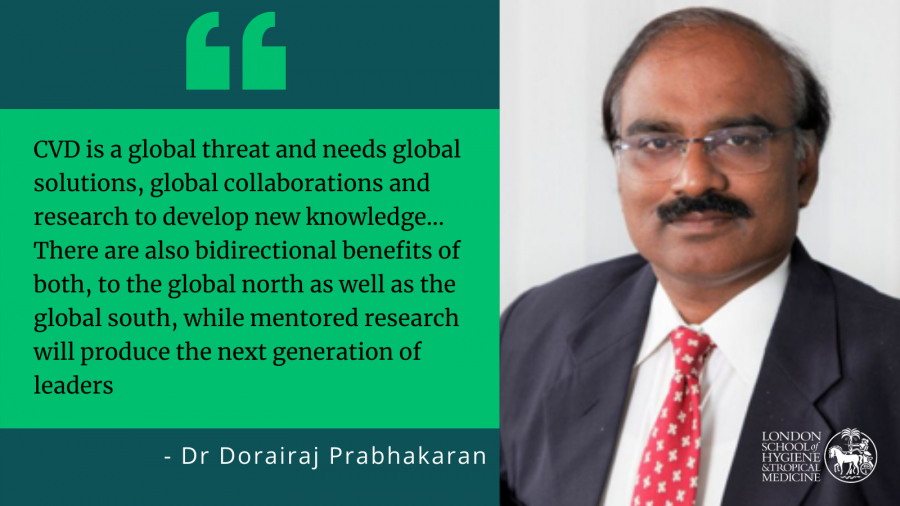
Dr Dorairaj Prabhakaran is a Professor of Non-Communicable Disease Epidemiology here at the London School of Hygiene and Tropical Medicine (LSHTM) and the Vice President of the Public Health Foundation of India, where he specialises in research and policy. As a driving force in establishing the Centre for Control of Chronic Conditions, Dr Prabhakaran has played a key part in revolutionising the prevention of cardiovascular disease (CVD) and diabetes in India. The centre conducts cutting-edge research into the high prevalence of these diseases in India, looking for evidence-based scalable and sustainable solutions.
We were delighted to hear that Dr Prabhakaran delivered the ESC Geoffrey Rose Lecture on Population Sciences 2020, with a focus on worldwide collaboration and how different settings can learn from one another to produce the best research outputs.
Geoffrey Rose – a prominent epidemiologist
Let’s start with a whistle-stop tour on Geoffrey Rose, his connections with LSHTM, and why the prestigious Population Sciences Lecture at the ESC Congress each year bears his name.
Born in 1926, Geoffrey was an eminent epidemiologist and is a prominent figure in LSHTM’s history. He joined LSHTM in 1956, became the Visiting Professor of Epidemiology and Preventive Medicine in 1970, and was elected to Full Professor of Epidemiology in 1977. Not only did he work with many pioneering epidemiologists, he’s also responsible for starting the Masters in Epidemiology course. This course now attracts up to 70 new students every year from around the world.
Geoffrey’s work transformed strategies for improving public health. Moving beyond epidemiology, his research, publications, and theories spread into other fields. Notably, he pioneered and proved the principle of the so-called ‘prevention paradoxes’. That a large number of low- risk individuals may give rise to more cases of disease than a small number of high-risk individuals. Additionally, when trying to put large scale prevention practices in place, individual members of that population might not see much benefit, but overall there will be an advantage.
For example, whilst a person with very high and uncontrolled blood pressure is more likely to have a heart attack, these people are in the minority. In numbers, many more people have heart attacks from the much larger lower risk group. So, at a population level, we regularly check blood pressure, run big advertising campaigns to spot the signs of a heart attack, and conduct life-support training. Even though it might not directly benefit every individual, it has an overall benefit of reducing heart attacks and related deaths.
Right now, as we all face fresh lockdowns and restrictions in the face of Covid-19, Geoffrey’s teachings ring more true than ever. He strongly argued that as citizens and as a society, we have a common responsibility to protect against threats. As he inscribed on the front cover of his book, The Strategy to Preventative Medicine, “We are all responsible for all” - Fyodor Dostoyevsky (1821–1881).
From one prominent scientist to another
Given Geoffrey’s strong ties to LSHTM, it was a delight to see another LSHTM Professor take to the stand to deliver a thought-provoking lecture this year.
Dr Dorairaj Prabhakaran is both a cardiologist and epidemiologist, and explained how he’s using Geoffrey’s population-based theories to shed light on the high diabetes prevalence in India compared to other nations.
Interestingly, this is a historical problem dating back to the 1900s, as Dr Prabhakaran noted by quoting the Lancet of 1907: ‘What gout is to the nobility of England, diabetes is to the aristocracy of India’. The mystery arises because the high burden can’t be explained according to conventional theory, as this increase doesn’t appear to be solely linked to BMI.
Or, to put it in stats, here’s another paradox. 69%* of adults in the USA are overweight or obese, and there is an 11% prevalence of diabetes. Whereas in India, only 13%* of adults in India are overweight but there is an 11% prevalence of diabetes. But why?
Hoping to unravel the knots in this tangled tale, Dr Prabhakaran has been working with the Centre for Cardiometabolic Risk Reduction in South Asia. This work includes a population-based sample of 19, 276 adults in Delhi and Chennai, which has enabled the team to do extensive studies with close to 400,000 stored samples of things like plasma, urine, and extracted DNA.
Dr Prabhakaran discussed the importance of collaboration and capacity-building in the context of setting up large databases like this this and finding solutions to the biggest global health challenges. Describing CVD as a global threat that requires global solutions and collaborations, he also described the benefits of working together;
‘There are also bidirectional benefits of both, to the global north as well as the global south…
At the intersection of public health, clinical medicine and research sits capacity building and the element of passing on knowledge, mentoring and training a new generation of researchers. This is one of the harbingers of success in our groups’.
You can read the full summary of Dr Prabhakaran’s lecture here.
*According 2013 statistics from the World Health Organisation.
References
Mark Nicholls, ESC Geoffrey Rose Lecture on Population Sciences 2020, European Heart Journal, Volume 41, Issue 39, 14 October 2020, Pages 3777–3778
Our postgraduate taught courses provide health practitioners, clinicians, policy-makers, scientists and recent graduates with a world-class qualification in public and global health.
If you are coming to LSHTM to study a distance learning programme (PG Cert, PG Dip, MSc or individual modules) starting in 2024, you may be eligible for a 5% discount on your tuition fees.
These fee reduction schemes are available for a limited time only.
